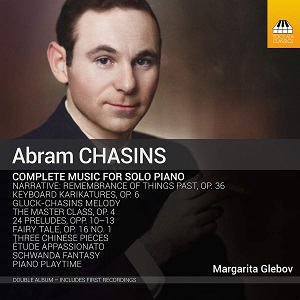
Abram Chasins (1903-1987)
Complete Music for Solo Piano
Margarita Glebov (piano)
rec. 2019-22, Elsie and Marvin Dekelboum Concert Hall, Clarice Smith Performing Arts Center, University of Maryland, USA
Toccata Classics TOCC0678 [32 + 57]
Abram Chasins’s prowess as a pianist-composer has long been eclipsed by his fame as a writer, commentator and broadcaster. He performed into the mid-30s but the development of radio allowed him the opportunity to broadcast a weekly programme called ‘Piano Pointers’ and thenceforth the direction of his career decisively shifted.
This is the first recording of his complete music for solo piano. One disc contains the series of Preludes he composed in 1928, cast in four sets of six. The use of 24 Preludes in all the major and minor keys is a well-established procedure, of course, but I suppose what marks out Chasins is not necessarily the unusual sequencing but the extreme pithiness of the preludes. Though they’re compressed in form one can still enjoy Chasins’s obvious sense of romantic ardour, derived largely – though not exclusively – from Rachmaninov, and rhythmic vitality. 17 of the 24 have never been recorded before, it would seem, and it’s therefore especially enjoyable to hear, say, the Lullaby, from the Op.10 set – one of only three Preludes to bear a title – where the mobility of the bass line constantly disrupts the otherwise clement progress of the music. Another of his influences was Gershwin, to whom one of the Preludes is dedicated, but his influence doesn’t really carry through to the style of the music. Technical flair, refinement, expressive projection, and romanticism inform most of the Preludes – even the rather odd march he dedicated to Josef Hofmann.
The second disc contains compositions written between 1925 – which includes Chasins’s ‘Greatest Hit’, Rush Hour in Hong Kong – to the set called Piano Playtime (1951). Again, these are compressed sets, bristling with personality and vitality. The youthful The Master Class is heard on disc for the first time, a full-steam-ahead quartet of pieces with plenty of fire and passion. Keyboard Karikatures is also heard in these premiere recordings that celebrate three leonine greats of the keyboard – Rachmaninov, Godowsky and the pianist then known as Bachaus (later with a ‘k’). I can’t say it really lives up to the intriguing stylistic premise of its title but it’s useful to hear. Perhaps the three could have done with some subversive degree of parody.
The Three Chinese Pieces have remained famous examples of Chasins’s wit and characterisation and Margarita Glebov, who has a resilient technique and extrovert tendencies – just what’s needed – plays them with real brio. Maybe Cherkassky’s HMV recording from the mid-50s has a greater complement of bravura but Glebov’s slower burn approach brings its own clarity and rewards. The Piano Playtime set consists of character pieces to be used as teaching aids – charming if largely inessential slivers. Of more significance is the piece Chasins admired most of all his piano works, namely Narrative, Remembrance of Things Past, Op. 36 which also happens to be his single longest piece at eight minutes. Clearly sectional but irradiated by March themes and other richly subtle devices, it’s most attractive, as is the (Weinberger) Schwanda Fantasy, a truly opulent paraphrase. The Gluck-Chasins Melody, based on the ‘Dance of the Blessed Spirits’ from Orfeo, is most famous from the Sgambati transcription and Chasins’s much more robust affair doesn’t match his.
Chasins made a series of LP recordings for Mercury in the late 40s and early 50s. Maybe Eloquence would be interested in reissuing them?
There are excellent notes from Donald Manildi, the recording quality is similarly top-notch and Glebov is full of technical fitness and subtle expressive ardour.
Jonathan Woolf
Help us financially by purchasing from


Contents
Complete Preludes, Opp. 10-13 (1928)
Piano Playtime (1951)
The Master Class, Op. 4 (1925)
Three Chinese Pieces (pub. 1925)
Keyboard Karikatures, Op. 6 (1925)
Fairy Tale, Op. 16 No. 1 (1931)
Narrative: Remembrance of Things Past, Op. 36 (1942)
Etude Appassionato (1925)
Gluck-Chasins Melody (1938)
Schwanda Fantasy (pub. 1940)


















